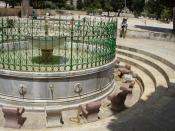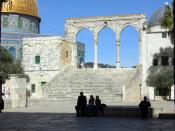In this book, published just before the outbreak of violence last September, Gorenberg focuses on the role played by the Temple Mount in the expectations of "millions of quite rational men and women, belonging to established religious movements around the globe, [who] look forward to history's conclusion, to be followed by the establishment of a perfected era." Although all three major monotheisms get their due in The End of Days, Gorenberg's main focus is on Christians and Jews. Muslims are cast, somewhat imprecisely, as spectators.
As Gorenberg tells it, a large number of evangelical Christians believe that the Second Coming of Jesus will occur after a long sequence of events both miraculous and terrible. In the "rapture of the church," a phrase popularized by the 19th-century British preacher John Darby, true Christians will fly up to heaven while the rest of the world faces seven years of tribulation proceeding the establishment of God's kingdom on earth.
Among the many events taking place in those years of tribulation, the Antichrist will desecrate the Temple in Jerusalem-an act suggesting by implication that the Temple itself will have to be rebuilt before the Last Days and the Second Coming can occur.
In short, millions of Christians around the world sincerely and devoutly believe that the status of the buildings on a plaza in Jerusalem will determine the fate of the human experience, if not of the cosmos. And this means, as Gorenberg writes, that, "through no choice of its own," the state of Israel has been cast "in a starring role in a Christian Endtime drama." According to the terms of that drama, it is imperative not just that Israel control the Temple Mount; the urgent task of rebuilding the Temple is a task uniquely designated for Jews, not Christians, to carry out.


